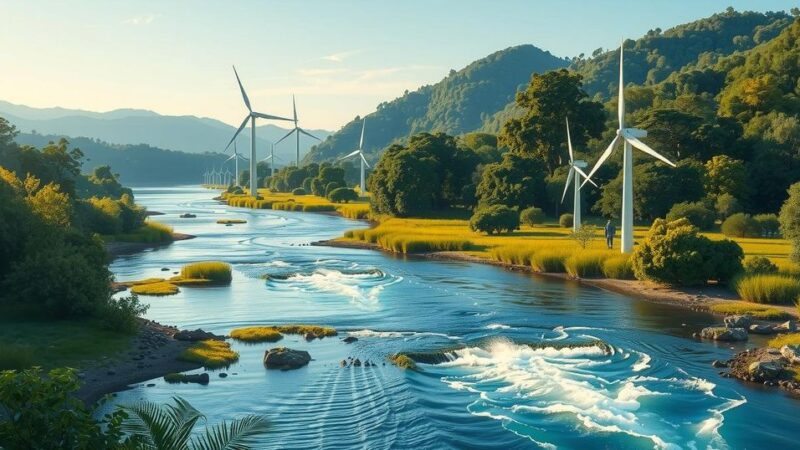The Uganda Water and Environment Week (UWEWK), initiated in 2018, promotes sustainable development in Uganda through collaboration and dialogue among stakeholders. UWEWK2025, themed “Water and Environment Resources for Enhanced Resilience and Improved Incomes and Livelihoods,” occurs March 17-21, addressing the urgent need for regenerative practices amid growing climate challenges. Organizations like Regenerate Africa focus on empowering communities through education in sustainable practices, demonstrating the importance of collective action in combating environmental degradation.
The Uganda Water and Environment Week (UWEWK) is a significant annual event hosted by the Ministry of Water and Environment, focusing on sustainable socioeconomic development in Uganda. Since its inception in 2018, UWEWK has fostered collaboration among political leaders, local governments, and stakeholders to promote dialogue and knowledge sharing aimed at improving the management of water and environmental resources. The 8th edition, UWEWK2025, is scheduled for March 17-21, with a focus on enhancing resilience and livelihoods, coinciding with International Forest Day, World Water Day, and World Meteorological Day.
Addressing Uganda’s environmental challenges requires a transition to regenerative practices, as conventional methods have proven insufficient in combating ecosystem degradation. Climate change effects, including erratic rainfall and droughts, disproportionately affect vulnerable communities, particularly farmers, women, and children, leading to food insecurity and poverty. The alarming loss of forests, recorded at 200,000 hectares annually, and the threat posed to water sources intensify these challenges, disrupting agriculture and isolating communities from essential services.
The Ugandan government, with various partners, has initiated measures to counter these challenges. Efforts led by the National Water and Sewerage Corporation focus on improving water supply, particularly in rural areas, while the National Forestry Authority promotes forest protection and restoration. Uganda’s Nationally Determined Contribution prioritizes climate resilience across sectors like agriculture and health, aiming to support vulnerable communities with sustainable practices.
Despite progress, there remains a need for scaling solutions to meet rising demands. Organizations such as Regenerate Africa are pivotal in this transition towards a regenerative economy. Their work emphasizes community engagement, training in regenerative agricultural methods, and the promotion of water and environmental management practices, particularly in the Lake Victoria basin. By teaching effective water conservation and agricultural techniques, they are enhancing food security and building resilience to climate change.
Regenerate Africa’s comprehensive landscape restoration initiatives underscore the importance of community involvement in environmental stewardship. By collaborating with local leaders and organizations, they ensure that restoration activities align with community needs while fostering sustainable practices that benefit both people and the environment. Partnerships with NGOs and private sectors are instrumental in scaling landscape restoration projects, helping Uganda to adapt and mitigate the impacts of climate change.
Through collaboration with Wine to Water, Regenerate Africa addresses water crises by distributing water filters in vulnerable communities. This initiative not only improves public health but also liberates women and girls from the burdens of water collection, thereby enhancing their opportunities for education and economic engagement.
As Uganda approaches UWEWK 2025, stakeholders are called to integrate climate adaptation and water conservation strategies into national budgets and policies. Initiatives should focus on climate-smart agriculture, community engagement, and collaborative efforts among civil society, the private sector, and academia to enhance environmental resilience and sustainability.
The upcoming UWEWK 2025 presents a crucial moment for reflection and renewed commitment to sustainable environmental management. Regenerate Africa emphasizes the importance of regenerative practices in fostering a resilient future and remains dedicated to empowering communities and restoring ecosystems through their continued efforts. All stakeholders must contribute to creating a sustainable future, ensuring equitable resource management and collaborative climate action.
In summary, the Uganda Water and Environment Week 2025 represents a pivotal opportunity to address pressing environmental challenges through effective strategies and collaborative efforts. With a strong focus on regenerative practices, community involvement, and innovative solutions, all stakeholders are urged to contribute toward building a sustainable and climate-resilient Uganda. The ongoing initiatives highlight the importance of resource management, empowerment of local communities, and the necessity for urgent action to safeguard Uganda’s water and environmental resources for future generations.
Original Source: www.pmldaily.com






